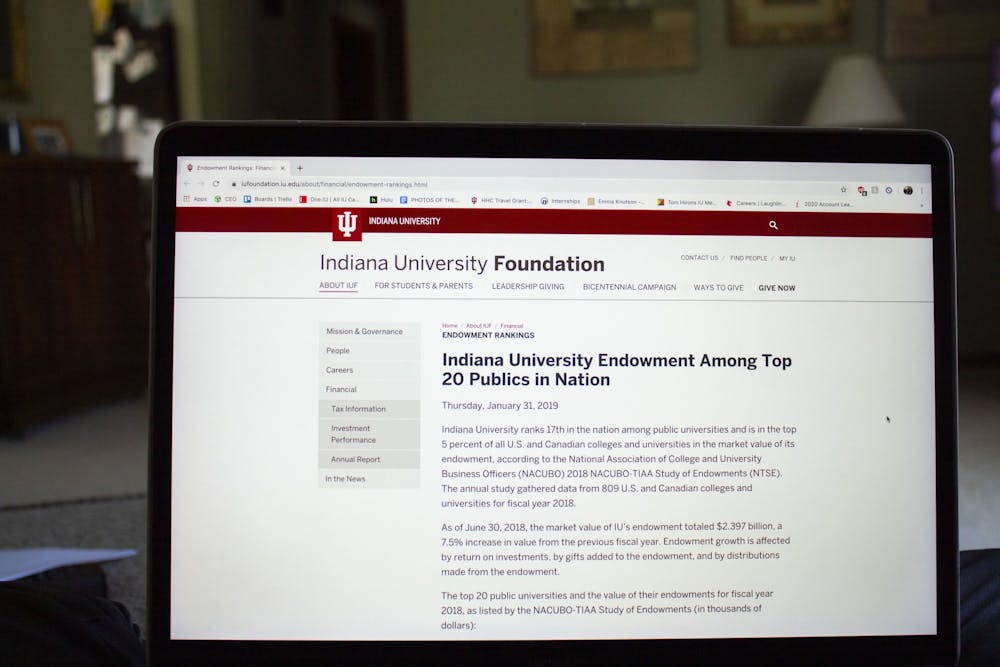Many students feel they should receive some amount of compensation for effectively attending online college for the rest of the semester, even if it is just what IU is saving in maintenance, custodial fees and utilities by having a closed campus. Meanwhile, the university is preparing for a budget deficit, with the Board of Trustees this month approving a request from President Michael McRobbie for a line of credit of up to $1 billion.
However, records show a partial refund for students would be feasible using unrestricted funds from IU's endowment. The university has the ability to use some endowment funds to provide aid to students, but in a limited capacity.
IU’s endowment, managed by IU Foundation, was worth $2.397 billion at the end of fiscal year 2018, according to a press release from 2019. Though much of a school’s endowment is restricted to a donor’s wishes on how the money is to be spent, 2-3% of the endowment is usually unrestricted, IUF spokesperson Matt Kavgian said in an email.
If the current endowment is close to its 2018 value, this would mean about $47.9 million is unrestricted. With that much money, IU could issue refunds of $1,000 to every full-time undergraduate student at IU-Bloomington.
Students at schools such as the University of Pennsylvania and NYU have urged administrators to dip into their massive endowments to provide relief to students.
But how can endowment money be used? The IU Foundation's policy dictates that priority for unrestricted funds goes to the university president to use at his discretion to meet “extraordinary needs." Unrestricted funds can also be used for student aid.
McRobbie should order any remaining funds under his discretion to go to student aid and reimbursements, as well as lobby the foundation and university to approve using unrestricted funds for further student reimbursement in the coming fiscal year. Some funds might already be allocated to another project or initiative, but he should divert whatever is available.
There are usually multiple restrictions on endowment funds. Donations can be restricted for any purpose the donor wishes, and only the additional earnings made from the investment, such as interest and dividends, can be spent. There are also limitations on when these earnings can be used.
IU Foundation had net assets, which includes endowment funds, exceeding $2.5 billion in fiscal year 2018, according to its Federal Form 990. About $84 million — more than 3% — of its net assets also had no donor restrictions. The foundation's annual net revenue was more than $173 million.
So in theory, IUF could help give every undergraduate student about $2,000 and still have $89 million in net revenue, based on the 2018 figures. It is important to note, however, that the exact amount that can be redirected to use for student aid is unknown.
Universities should have endowments that can sustain them in times of hardship and allow for stable growth. But in unusual circumstances like these, it would be appropriate for IU Foundation to only make $89 million if it can give some funding to students, who pay as much as $50,000 to attend IU.
We should also consider how an endowment is intended to be used. Endowments aren’t just break-glass-in-case-of-emergency funds. They are meant to provide a solid base of funding and growth for the university for years to come. And that is a good thing. But that isn’t to say that small portions of endowments can’t be used for emergency purposes.
With markets at recession level lows, it would be imprudent to immediately divest from publicly traded securities. Invested money should be saved for refunds when it is wiser to sell. However, available dividends and interest should be used immediately to issue at least partial refunds.
I understand it is unrealistic to bankrupt the endowment in response to this crisis by eliminating all profits. That would be irresponsible. But I am confident that there are a variety of options that are available that would at least save students what the school is saving by no longer having an open campus.
It seems that every full-time undergraduate student at IU-Bloomington could receive a refund of between $1,000 and $2,000, and the endowment would be just fine in the long run. The university will survive.
Brett Abbott (he/him) is a freshman studying finance and is the press secretary for College Republicans at IU. He plans to pursue a career in business or politics.






